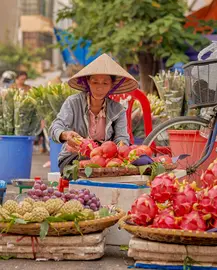Food policy engagement across Asian cities
April 05, 2023.
Ensuring food security in rapidly expanding cities is a major challenge for local governments. Urbanization has created fragmented areas and slums, altered the structure of urban food markets, increased rural-urban competition for natural resources, and affected agricultural supply chains.
Food-related competencies at different policy levels
Historically, production of and access to food have been out of the scope of urban planning. This is largely due to most countries’ traditional view that national entities such as the Ministry of Agriculture are responsible for food-related matters. Given the current food-related challenges facing cities, including malnutrition, food safety, or food waste, local governments are gradually engaging in food strategies to ensure healthy and sustainable diets for their citizens. These strategies entail policies or programs such as enforcing land-use zoning or taxes on unhealthy food, providing school meals, or setting up food banks. Yet, the extent to which cities can actively implement these strategies is linked to their mandates, or ability to act. This means that cities might depend on higher levels of government (provincial or national) to administer food issues.
Role of cities in Asia: ZEF study based on unique dataset
There is an abundance of case studies illustrating the different roles cities play in food systems. However, there is only limited literature on cross-city comparison, though this could be helpful to explore common patterns of what factors influence cities to engage in food policy and what type of engagement they choose. A new (forthcoming) ZEF study investigates the overall state of urban food policy across Asia. Using a unique dataset of 171 Asian cities from 21 countries, the study explores the association of demographic, institutional and geographical factors with the level of food policy engagement. To analyze this relationship, cities were categorized as reactive, engaged, progressive, or food-smart. This categorization was based on a scoring system including three criteria: Cities were evaluated or benchmarked according to how their food policies (if any) are proactive (or forward looking), integrative (or multi-sectoral) and inclusive (in policy design or orientation). In addition, the study describes food-related mandates, challenges, opportunities and programs at city level. The results show that, with some exceptions of medium-sized cities, the majority of Asian cities are at an early stage when it comes to engaging in food-related matters. While cities have mandates related to food (e.g., upgrading public markets), most of the time they are implementing national policies. The commitment of local leaders to engage in food matters was found a key factor in advancing the issue of food in urban agendas. Raising awareness of the opportunities for city leaders to unlock potentials and options to act within given food systems settings can influence this commitment.
This article is based on a forthcoming publication written in collaboration with Steven Jaffee (University of Maryland, College of Agricultural and Natural Resources) and Navneet Kumar (ZEF senior researcher).
Author: Miriam E. Romero is a senior researcher at ZEF.
Contact: mromeroa(at)uni-bonn.de
This article was published in ZEF News No. 46.



